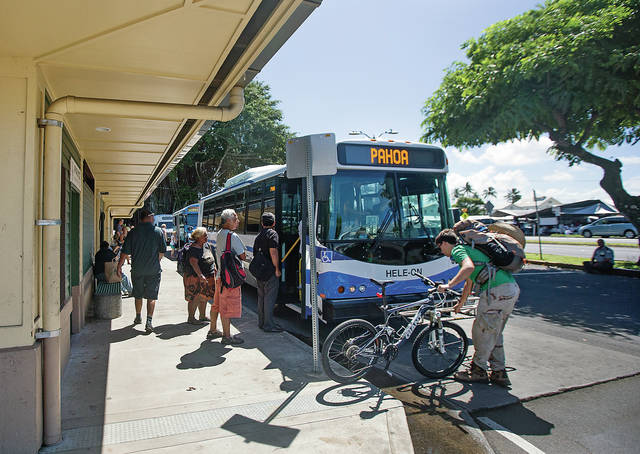Mass Transit Administrator Tiffany Kai is stepping down and Mayor Harry Kim is bringing in a retired U.S. Marine to whip the struggling Hele-On bus system into shape. ADVERTISING Mass Transit Administrator Tiffany Kai is stepping down and Mayor Harry
Mass Transit Administrator Tiffany Kai is stepping down and Mayor Harry Kim is bringing in a retired U.S. Marine to whip the struggling Hele-On bus system into shape.
Kim said Monday he started on a plan to fix problems plaguing the county bus system after getting a lot of complaints from riders. He said his behind-the-scenes efforts began months before a Hawaii Tribune-Herald and West Hawaii Today article Sunday pointed to serious flaws.
The new consultant, Curtis Sharp, a retired Marine who has worked at such places as Abu Dhabi, has a stellar resume, Kim said. He’s expected to start May 1. Sharp could not be reached for comment by press time Monday.
The temporary position, Mass Transit analyst, will pay in a range similar to when it was held by retired Mass Transit Administrator Tom Brown, officials said. Brown was paid a yearly rate of $43,824 when he held a succession of part-time 89-day contracts from May 1, 2013, to April 30, 2014, for former Mayor Billy Kenoi’s administration.
More details about the 89-day contract weren’t available Monday because it was in the process of being executed, personnel from the Human Resources Department said.
Kim said he’ll begin advertising for the permanent administrator position soon. That position, an excluded managerial civil service position, has an annual salary range of $70,404 to $100,176, according to charts provided online by the state Department of Human Resources Development.
Kai took the high road about her pending demotion to para-transit coordinator.
“I decided maybe it’s best if I step down,” Kai said. “Mass Transit has grown and there’s a need for someone more qualified to bring it to a higher level.”
The county’s 55-bus fleet is down to just 25 buses because of engine problems and other malfunctions. Service deteriorated as mechanics waited for parts — including five full engines — to be shipped to repair the buses.
The county was patching the pukas by renting vehicles from Polynesian Adventure Tours, which holds the driver contract, but that resulted in bus shortages and route cancellations in Kona on those days the cruise ship was in, because the company needed the vehicles for its own private tours.
Rider complaints escalated as “hiki ole ke hele,” or broken-down, buses and their passengers sat stranded on roadsides until substitute buses could be found.
Buses on some routes were running one, two, even three hours late, according to posts on the Facebook Hele-On users group.
The county will soon receive five retired buses from Honolulu, and it is working with the Department of Public Works to get the other buses repaired as soon as possible.
The agency has a $13.8 million budget, which is projected to rise 6 percent next year. Federal grants account for just $1.2 million of the budget, and with fares accounting for $960,000, the county pays an average $11.77 per rider. Riders pay $1-$2 fares, depending on their age and whether they have disabilities.
Kai was grilled at length April 13 by County Council members as she presented her budget plans for the year.
Hilo Councilwoman Sue Lee Loy, learning of the new developments, said she had mixed feelings about how they will affect the bus service.
“It’s a critical service. It’s needed and we’ve got to get good at it,” Lee Loy said. “This is more than an 89-day solution. I look forward to hearing the administration’s plans for a long term structural change because a well-managed mass transit system is critical to the success of Hawaii Island and its people.”
Email Nancy Cook Lauer at ncook-lauer@westhawaiitoday.com.



